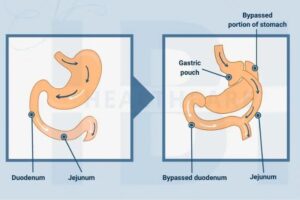IBI Healthcare Institute is a world-renowned facility for weight loss surgery (bariatric surgery). Dr. A. Christopher Ibikunle, MD, FACS uses the most advanced, innovative surgical techniques.
Weight Loss Stomach Surgery
Bariatric surgery (or stomach surgery) works because it physically appends your stomach’s anatomy, restricting overeating and thus weight gain. Hunger is reduced, and a sensation of fullness becomes the norm. As weight loss ensues, you become more physically active, setting a positive cycle of continuous fat-burning in motion.
Weight loss and stomach surgery can lead to a renewed joy in being alive, enhanced self-esteem, and improved social relationships, both at home and in the workplace. Furthermore, it greatly reduces the emotional symptoms of obesity. Such as anxiety and depression that are co-related.
Bariatric surgery is a range of surgical procedures to help individuals with higher body weight to lose weight and get healthier. These procedures work by changing the digestive system to limit food intake, reduce nutrient absorption, or both. Bariatric surgery is considered when diet and exercise haven’t worked and when serious health problems related to obesity like type 2 diabetes or hypertension are present.
Types of Bariatric Surgery
Roux-en-Y Gastric Bypass
This procedure creates a small pouch at the top of the stomach and connects it directly to the small intestine, bypassing most of the stomach and a portion of the intestines. Limits food intake and reduces calorie absorption.
Sleeve Gastrectomy
In this procedure, about 80% of the stomach is removed, leaving a small tube-like section. Reduces the stomach’s capacity and decreases the production of the hunger hormone ghrelin.
Adjustable Gastric Band
The surgeon places an adjustable band around the upper part of the stomach to create a small stomach pouch. Then the band can be tightened or loosened to control food intake.
Biliopancreatic Diversion with Duodenal Switch (BPD/DS)
Indeed, this is a complex procedure. Particularly involves removing a large part of the stomach and bypassing a significant portion of the small intestine. Eventually, reduces food intake and limits nutrient absorption.
Single Anastomosis Duodenal-Ileal Bypass (SADI)
Similar to the duodenal switch, SADI also involves a sleeve gastrectomy. Followed by a bypass of a significant portion of the intestine, but with a single anastomosis connection.
Why Bariatric Surgery – Important Considerations
Certainly, bariatric surgery is a powerful tool to lose weight and get healthier. However, it requires lifelong changes and regular medical follow-up.
Eligibility
Typically for people with a BMI of 40 or higher, or 35 and higher with obesity-related health issues.
Risks
As with any major surgery, there are risks, infections, blood clots, and nutrient deficiencies.
Commitment
Requires long-term lifestyle changes, diet and exercise, and regular medical follow-ups.
Why Bariatric Surgery – Recovery and Post-Operative Care
Recovery Time
Varies by procedure; minimally invasive procedures are quicker.
Diet
Gradual introduction of foods, liquids first and then solids.
Follow-Up
Regular check-ups to monitor weight loss, nutrition, and overall health.
Why Bariatric Surgery – Key Factors
- Say goodbye to stress and hello to happiness.
- Health improvements such as Type 2 diabetes and heart disease.
- The weight loss balloon procedure takes less than 15 minutes and no cuts or stitches.
- Do not let pricing defer you from changing your life today! Payment plans are available.
- A surgical procedure that will benefit your weight-loss journey forever and not just temporarily.
- Increased confidence not only in yourself but confidence in the choices you make to live a healthy life!
- Bariatric surgery (surgical changes to the stomach) helps to jump-start your chance to become more active to increase fat burn.
- Multiple options to choose from such as the gastric sleeve, gastric bypass, and the popular growing non-surgical Spatz3 adjustable gastric balloon.











